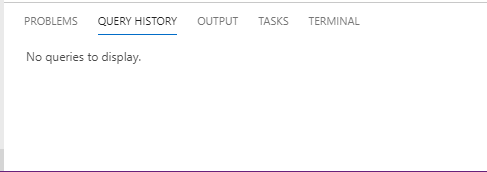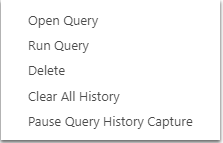Bumps [semver](https://github.com/npm/node-semver) from 5.7.1 to 5.7.2. - [Release notes](https://github.com/npm/node-semver/releases) - [Changelog](https://github.com/npm/node-semver/blob/v5.7.2/CHANGELOG.md) - [Commits](https://github.com/npm/node-semver/compare/v5.7.1...v5.7.2) --- updated-dependencies: - dependency-name: semver dependency-type: indirect ... Signed-off-by: dependabot[bot] <support@github.com> Co-authored-by: dependabot[bot] <49699333+dependabot[bot]@users.noreply.github.com> |
||
|---|---|---|
| .. | ||
| images | ||
| src | ||
| .eslintrc.json | ||
| .gitignore | ||
| .vscodeignore | ||
| README.md | ||
| coverConfig.json | ||
| extension.webpack.config.js | ||
| package.json | ||
| package.nls.json | ||
| tsconfig.json | ||
| yarn.lock | ||
README.md
Query History
Adds a Query History view for viewing and running past executed queries.
How do I view the history?
Query History is initially as a tab in the tab panel, which is toggled by the View: Toggle Panel or Query History: Focus on Query History View commands.
This view can be moved similar to other views into other view containers by dragging and dropping into the desired view container.
Initially this view will be empty but once you execute a query editor that will be captured in the window - with a separate row displayed for every query executed.
Each row consists of 4 parts :
- Status icon : This will be a ✔️ if the query executed successfully. If any errors occurred a ❌ is shown.
- Query Text : This is the text of the query that was executed
- Connection Info : The Server and Database the query was executed against
- Timestamp : The date and time the query was executed
Disabling/Enabling Query History
Query History capture can be enabled/disabled in one of two ways :
- Through the action button on the view container - this will be a ⏸️ when capture is enabled and clicking it will disable capture until re-enabled. When capture is disabled this button will be a ▶ and clicking it will enable capture until disabled.
- By running the Query History: Pause Query History Capture or Query History: Start Query History Capture commands from the command palette.
Query History row actions
Right clicking on a history row will bring up a menu with a number of actions available.
Open Query
This will open a new query editor window populated with the query text from the query executed and using the connection of that query.
Run Query
This will do the same thing as Open Query but will additionally run the statement immediately.
Delete
This will permanently delete the selected history row.
Clear All History
This will permanently delete ALL history rows.
This action is also available from the command palette (Query History: Clear All History) and as an action button on the panel.
Configuration
Configuration settings can be found in the Query History section. See the Feature Contributions tab for details on all the avilable settings.
Data Storage
If persistence is not enabled then all information is stored in-memory and not persisted upon application exit. If persistence is enabled then information is written to disk in an encrypted file which can be located by running the Query History: Open storage folder command.
The number of entries stored is controlled by the queryHistory.maxEntries configuration, once that many entries have been stored then any new entries will cause the oldest item to be removed.
Code of Conduct
This project has adopted the Microsoft Open Source Code of Conduct. For more information see the Code of Conduct FAQ or contact opencode@microsoft.com with any additional questions or comments.
Telemetry
This extension collects telemetry data, which is used to help understand how to improve the product. For example, this usage data helps to debug issues, such as slow start-up times, and to prioritize new features. While we appreciate the insights this data provides, we also know that not everyone wants to send usage data and you can disable telemetry as described in the Azure Data Studio disable telemetry reporting documentation.
Privacy Statement
To learn more about our Privacy Statement visit this link.
License
Copyright (c) Microsoft Corporation. All rights reserved.
Licensed under the Source EULA.


